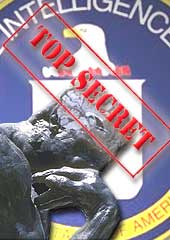Iran and Intelligent Opposition
Are U.S. intelligence services a more effective counterweight to the Bush Administration than the U.S. Congress?
December 6, 2007

Let us start with the observation that the patriotic — or nationalist — right usually is not the political camp in the United States that one would suspect to be highly critical of the nation’s intelligence services.
And the political left is not usually looking to those services as a rare inspiration of civic courage in otherwise depressing times. What clearer indication can there be about how twisted things are in the U.S. of A. today?
But here we are. Republican presidential candidate and U.S. Senator John McCain has labeled the Central Intelligence Agency “not only dysfunctional, but a rogue organization.”
By that logic — and that of the true believers — the U.S. intelligence community has once again acted as a “rogue” organization — by stabbing the president’s and vice president’s war plans for Iran in the back.
However, given the continuing and pervasive dysfunctionality of vital parts of the classic U.S. system of checks and balances — and the complicity of prominent Democratic senators such as Hillary Clinton in the Iraq and now Iran warmongering — the community had little choice than to diverge from the chorus line.
Senator McCain is actually right about his claim that there is something profoundly “dysfunctional” at hand on the inside of the U.S. government — but it is not so much the intelligence community to which that label applies.
Here is why: In a democracy, there normally is an opposition party in the legislative branch that is keen to challenge the government. This applies all the more when opposition members harbor serious doubts about the government’s judgment on matters of war and peace.
Unfortunately, too many Democrats in Congress — always with an eye on the 2004 presidential elections — made a cynical calculation when the time came to support or oppose the Iraq War. In light of the popular support for President Bush after 9/11, many of them chose not to oppose the president on going to war with Iraq.
Rather than taking a principled stand, many Democrats figured they would be better off politically by speaking out against the war only after it ran into trouble.
Where such twisted thoughts ultimately left the Democratic Party could be seen in the hopeless gyrations of John Kerry during his failed 2004 presidential campaign. He could never extract himself from the mumbo-jumbo he — and many of his colleagues — had constructed for themselves.
Democrats aside, the mainstream U.S. media did not do themselves — and their nation — any prouder. Faced with a wave of patriotic fervor and their own declining significance in the Internet age, supporting the president — no questions asked — seemed to them the right thing to do.
Will all that complicity, most major media missed out on their role as active questioners of power — and truth-telling mechanisms — on behalf of the people.
Rather, they — much like the Democrats — opted to keep their doubts to themselves and toe the party line, acting mostly as mere megaphones of the executive branch.
In the context of this atrophied system of checks and balances, the U.S. intelligence community has continued to find itself under unprecedented pressure to present the intelligence that would fit the president’s chosen course of action.
Any intelligence findings that were not in support of an invasion of Iraq were handily re-interpreted as “white noise,” while everything possibly in support of the president’s course was likely labeled hard and incontrovertible evidence.
The outcome was epitomized by George Tenet’s (in)famous “slam dunk” assurance to President Bush.
Another example of the truth being twisted by members of the Bush Administration and some of their media supporters occurred when they asserted that allied intelligence services — including from Germany and France — supported the analysis that Iraq had WMD.
But left out was the inconvenient truth that none of these services thought that Iraq’s suspected WMDs posed an imminent danger that warranted an ill-prepared invasion.
For these reasons, the intelligence community has learned the cardinal lesson — and has chosen to speak out. Intelligence agencies were — and are — worried about political loyalty to the president’s agenda becoming the leitmotif of U.S. intelligence.
And on the Iran (aka “World War III,” according to George W. Bush) issue, they also knew that this would lead the country down a dangerous path, where policy decisions increasingly became faith-based, rather than fact-based.
Over the past few years, the only way to get out the word on the dubious conclusions that top administration officials were presenting as hard facts was to leak information to the media.
This was done in hopes of generating critical stories that might then lead to further questions by the media and opposition lawmakers. And it caused them to take a principled stance — by issuing the National Intelligence Estimate, pouring doubt over the case for bombing Iran.
What matters most in all this is that very few people would earnestly believe that intelligence officers — as well as some high-ranking generals, for that matter — are easily given to expressions of distrust of their commander-in-chief.
That it even came to the point where some members of the intelligence community felt compelled to act as a political opposition is a clear sign of how dysfunctional U.S. democracy has become.
Read previous

From Bombs to Boom: Belfast Reborn
December 5, 2007
